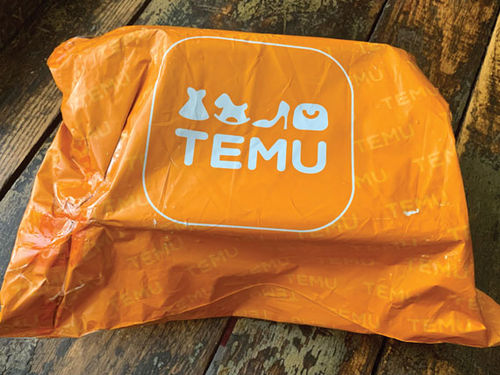
Jamie Biesiada
Have you shopped on Temu.com yet? It's kind of chaotic.
The online marketplace offers a huge variety of goods, from clothing to toys to electronics and beyond. And a lot of it is incredibly cheap (its name means "team up, price down"). Launched in the U.S. last year, it has caught on with consumers, especially in the face of inflation and economic uncertainty. Its Super Bowl commercial, leading with the tag line "Shop like a billionaire," didn't hurt.
Temu uses a "next-gen manufacturing" model, sharing market insights with sellers to help them adjust their products for increased sales. It also serves up products "customers may not know that they need" based on searches, according to its website.
When you open Temu's app or website, you're bombarded with notifications of sales, lightning deals, countdowns for free shipping and a lot of language designed to pressure you to quickly make a purchase. At least that's how I felt.
Temu is also pretty aggressive with its email and text message marketing. I really enjoyed the language of a text I got on a recent morning: "This is a letter of appreciation with a surprise inside: Click to reveal your huge surprise" (up to 90% off, a "hot sale" on certain items).
It's a lot. But it's kind of addicting.
I wanted to buy something just to try it out. I read some things online that suggested the process would be akin to purchasing something, waiting two weeks and hoping it showed up. The Better Business Bureau's page on Temu has plenty of colorful comments.

The author's package from Temu. Photo Credit: Jamie Biesiada
I ended up buying some off-brand replacement Nintendo Switch controllers for less than $25 (compared with $79.99 for Nintendo's). My delivery window was between July 4 and 6. They arrived on the 5th and worked just fine.
But I'm still struck by Temu's look and feel, in particular.
Is this the future of retailing?
More specifically, is this kind of selling -- aggressive digital marketing and all -- in the cards for retail travel sales?
It's hard to imagine most travel agencies creating websites and apps with really aggressive marketing akin to Temu's. Sure, many of them highlight particular deals, but Temu is next-level, with pop-ups left and right asking you to do things, like spin a digital wheel for free stuff.
I especially can't picture a luxury- or ultraluxury-focused agency using that kind of marketing. They're far more high touch with clients and always will be.
That said, I think there are some relevant takeaways from Temu's approach.
I get several texts and emails from the company every day. It's a little annoying, but they are absolutely top of mind. I'm not suggesting that level of contact with your clients, but some advisors might want to lean more into the idea of auto-scheduling emails, even when clients don't have a trip planned with you.
Before I downloaded the app, Temu accounted for what felt like 75% of the ads I saw on social media. Eventually, I gave in and downloaded it. It's another feather in Temu's cap for persistence and presence in a crowded digital landscape. It's also a lesson in showing up where clients, and potential clients, like to hang out.
Temu is also pretty buzzy right now, and so are advisors.
Time will tell as to Temu's sticking power. But advisors are here to stay, and now is the time to capitalize on that buzz and grow your book of business.